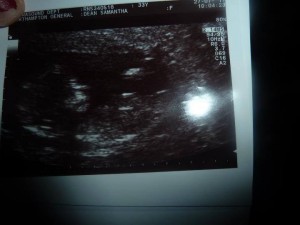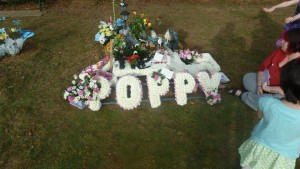Miscarriages / Stillbirths
Miscarriage and the Confusion of Sinful Grief: A Response
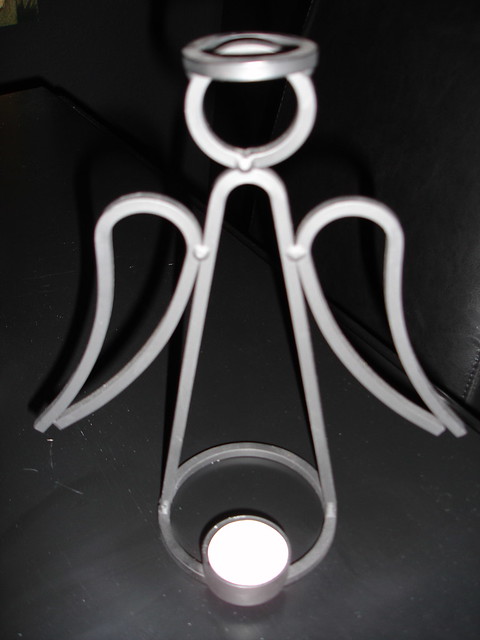
© 2007 Melissa Doroquez, Flickr | CC-BY-SA | via Wylio
I stumbled upon an article entitled Miscarriage and the Confusion of Sinful Grief that was posted at the Reformed Christian website “The Gospel Coalition”.
Jamie Carlson (who recently miscarried) wrote the post as a reflection on sin and grief. Here’s a quick except from her post:
After my miscarriage, it hit me—grieving and sinning go together. Perhaps the most confusing and ongoing part of miscarriage recovery was fighting temptation and rooting out the sins laid bare by suffering. Grief came as expected, but the intensity of emotions made it so difficult to distinguish temptation and sin from grief that I was paralyzed—unable to move forward toward healing.
Jamie continues by stating that soon after she miscarried, a number of her friends started announcing their pregnancies. She classifies her reactions of jealousy, annoyance, anger and minimization to such announcements as “sin”, as something inherently wrong.
Part of me is sensitive to Jamie’s situation. My wife and I often experienced similar feelings of jealousy after we came to the realization that we were infertile. It was hard to share in another person’s pregnancy announcement when we knew we could never conceive.
And while I respect Jamie and her attempt to overcome her feelings of jealousy and anger towards other expecting mothers, I think it should be made absolutely clear that grief is NEVER inherently wrong.
As much as I disagree with Jamie’s basic idea that “sinning and grieving” go together, we should understand that we DO stupid things when we grieve. And there ARE healthy ways to grieve and unhealthy ways to grieve. Not every response to grief is good. Not every way of handling grief is healthy.
But the conversation becomes really convoluted when we shift our talk about grieving from “healthy grief vs. unhealthy grief” to Jamie’s language that points to “holy grief vs. sinful grief.”
Healthy grief is always messy, disorganized, and full of new, raw emotions. Healing a wound involves blood, scabs, stitches, bandages and other less desirable devices. Same with healing from grief (although I’m not sure we ever really heal from grief). There are healthy ways of healing a wound and there’s unhealthy ways. To think, though, that those unhealthy ways are sinful only adds another burden to the already burdened soul of the bereaved.
Associating grief with sin encourages our strong tendency for people to hid their grief. It’s culturally normal for us to repress our thoughts, our tears, our emotions to the detriment of our healing. Imagine how much more we’d repress our thoughts, our tears, our emotions if we thought such things were boarding sinful?
Grief must be shared. It must be talked about. And it should never be hidden like it’s some ugly sin.
I hope Jamie finds healing. And I hope she finds friends who let her share her very normal, very human and very messy grief.
On Sharing the Silent Grief of Miscarriage
Miscarriages cause a silent grief. A nameless grief. Often a disenfranchised grief.
A grief for one who had no connections in life. No schoolmates, no friends, no co-workers … all of which translates to no funeral. A grief that can’t be shared.
A grief to be borne solely by the ones who conceived. A grief that is carried by the one who may now feel guilt upon silent grief because she miscarried.
This is a grief that is often carried alone. A grief that is too often complicated by guilt. A grief that is private and difficult to share. A grief for a nameless soul.
*****
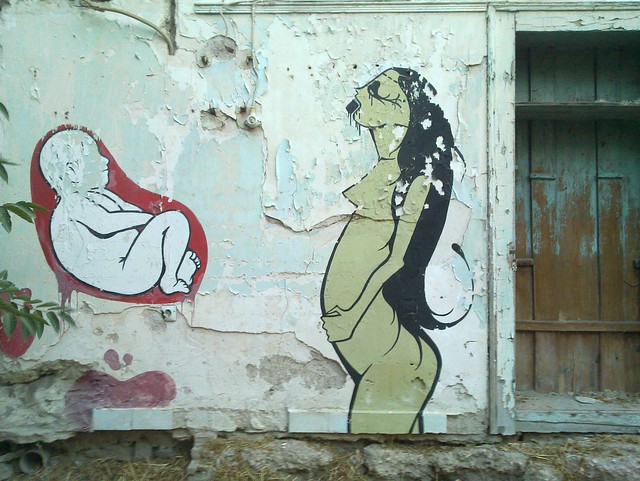
© 2010 Konstantinos Koukopoulos, Flickr | CC-BY | via Wylio
I’ve seen all too many women (and some men) try to be strong after a miscarriage only to find the grief manifest itself over the next couple months and even years. This is a very real grief and it’s not to be brushed aside.
It’s often traumatic.
Often bloody. Painful.
Often lonely. Powerless.
I remember a bible professor express the need for prayer to my class because his wife had just miscarried. Despite the fact he was asking for prayer, his request was quite smug and short, as if it wasn’t a big deal. Being that my class was a Degree Completion Course, there was a number of older women who quickly asked, “How’s your wife doing?”
He responded, “Oh, she’s fine. It’s not a big deal.”
To that another lady quickly rebutted, “It might not be a big deal to you, but it is to her. And if you have that attitude, it will be a bigger deal in months to come.”
Sure enough, she was right as months later the Prof. shared with the class that his wife was suffering from depression and was entering counseling.
The grief from miscarriages is very real and it doesn’t matter what trimester the miscarriage takes place.
“Women themselves will say, ‘How can a loss at 20-plus weeks be the same as a loss at six weeks?'” said Emma Robertson Blackmore, an assistant professor of psychiatry at the University of Rochester Medical Center who has studied moods during pregnancy, post-partum depression and the effects of miscarrying. “But research says the level of symptoms and impairment is the same.”
*****
Over the course of my 10 years in funeral service, I’ve seen the parents of a miscarried / stillborn child do two things that seem to be very healthy:
1.) Name their child.
2.) Plan a funeral for their child.
I have to admit that the first time I worked a funeral for a couple that miscarried, I thought it wasn’t worth my time. But that all changed when I saw the utterly disheartened grief on the face of the mother and expecting father. They were devastated.
We performed most of the services for free, and I imagine most funeral homes do the same, but honestly, especially for miscarriages, there is no need for a funeral director, but there IS a need for a gathering with your closest friends and family … those who love and support you … to express their love for you. It’s one of those seemingly selfish things that’s entirely unselfish. Because it’s a time for others to recognize the loss, grieve with you and have an opportunity to pour out their love for you.
Name the child.
Don’t let the child be nameless. For both the child’s sake and for your own sake. Name the child so that you can have a more defined grief process.
And even if the the child was miscarried years ago and you suffered in silent grief … it’s never too late.
Even if it’s just you and your spouse, or you and a close friend, have a small service where you remember and reflect on your hopes and dreams for a future that ended too soon.
Grief shared is grief diminished. It’s time to share.
And it’s time we take miscarriages / stillbirths very seriously.
Breaking the Isolation of Stillbirth
Today’s guest post is written by Samantha Allington.
****
On Thursday 8th September 2011 I was 19 weeks and 3 days pregnant when my waters broke at home. I knew in that instant that my baby wouldn’t survive but I still wanted to hang on to the little bit of hope that some miracle would happen and my pregnancy would proceed safely against the odds.
I was rushed in to hospital by my birth Doula where I was checked over by the doctor who confirmed I had lost amniotic fluid. After a scan to measure the fluid levels I was told there was not enough water to support my baby’s lung development and that due to diabetes I was at high risk of death too.
I had to face the hardest decision of my life and after spending from then till the Monday following refusing outright to terminate my pregnancy, I finally conceded to allow the medical team to induce labour at just 20 weeks gestation. There would be no intervention to save my baby as I was under 24 weeks pregnant and hospital policy didn’t permit resuscitation at that age.
I was in an abusive relationship with a violent partner and I chose to go through labour and birth with only my Doula present. It was a harrowing experience to say the least but I was still determined to make my baby’s birth as natural and beautiful as I could. I wanted it to be special and memorable, for my last moments with my baby to be precious.
We had a candle lit room (LED tea lights and colour changing lotus flowers), aromatherapy, crystals and the Obstetrician permitted me to have a natural birth without any electronic monitoring (no wires or drips) so that I could move around freely. The midwives allowed us the space we desired and only came in to check once in a while how contractions were developing.
Finally it was time to give birth and despite holding on for as long as I could refusing to push, my daughter finally entered the world at 5:28am on 14th September 2011 at just 20 weeks and 2 days gestation as the sun was rising.
She was about the size of a Barbie doll at just 20cm length and weighing a tiny 10.5 ounces. Despite her tiny size she was perfect in every way, with ten fingers, ten toes, perfectly formed ears and a little pink nose, I even noticed in the right light she had the fairest eyelashes I’d ever seen.
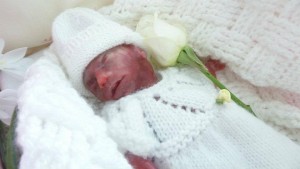 I spent 2 days alone with her in the hospital, holding her, kissing her and trying to take in every little feature so that it would be burnt to memory forever. I didn’t want to let her go or say goodbye, I wanted those days to go on and never end, but of course they did end and I had to leave the hospital.
I spent 2 days alone with her in the hospital, holding her, kissing her and trying to take in every little feature so that it would be burnt to memory forever. I didn’t want to let her go or say goodbye, I wanted those days to go on and never end, but of course they did end and I had to leave the hospital.
Arriving home it was time to start planning her funeral, she’d never get a birthday, Christmas, Easter or a wedding day, her funeral was the only special occasion she would ever have, and the only thing I could do for her to make it as important and special as I could. I contacted the charity Children Are Butterflies who work alongside B Hollowell and Sons funeral directors. They fund children’s funerals and the lady that runs it was lovely.
Due to the abusive relationship I was in, I was again alone in planning my daughter’s funeral but Ann made everything go easier and smoother. She was so kind and supportive towards me and I know I will be eternally grateful to her for all she did.
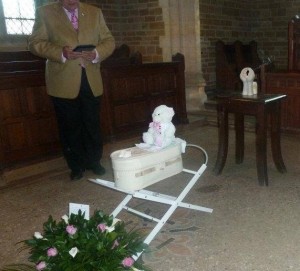 The funeral was beautiful. We had a Hearse that was made from an old London black cab to take Poppy-Rose to her last resting place and a beautiful white woollen coffin with an embroidered name plate. The funeral was white, pink and butterfly themed. Poppy’s coffin looked so tiny at the front of the chapel resting on a Moses basket stand that was far too big. We read poems and I gave her Eulogy before moving to the graveside for her internment. Each guest was given an incense stick to light and place in the ground around her grave and a paper butterfly to write a message on for her. As we said goodbye a beautiful red butterfly flew across her grave, unusual for the time of year here in England.
The funeral was beautiful. We had a Hearse that was made from an old London black cab to take Poppy-Rose to her last resting place and a beautiful white woollen coffin with an embroidered name plate. The funeral was white, pink and butterfly themed. Poppy’s coffin looked so tiny at the front of the chapel resting on a Moses basket stand that was far too big. We read poems and I gave her Eulogy before moving to the graveside for her internment. Each guest was given an incense stick to light and place in the ground around her grave and a paper butterfly to write a message on for her. As we said goodbye a beautiful red butterfly flew across her grave, unusual for the time of year here in England.
I wanted to share my story because often talking about baby loss is considered taboo but especially in cases of termination for medical reasons. This leaves so many women (and families) feeling isolated and alone in their grief. I wanted a chance to give my side of the story, to show you how much we all need that little bit of help, compassion and love. We don’t all have family to stand by us; some of us feel so alone in our grief. We go through all the usual feelings such as sadness, despair, anger but often we also feel guilt and self-blame and this can only be made worse when we are silenced by others negative judgements , we need to be allowed to speak out and to share our stories, our personal journeys with others.
The God Who Remembers
I’m a funeral director. Have been for the past 10 years. And during those ten years, I’ve helped numerous families memorialize miscarriages and still born babies.
As a male who often finds himself in that “insensitive” category, I used to secretly wonder why there’s a desire to memorialize those not yet born.
After all, what’s to memorialize?
When I first became a funeral director, I struggled to understand how I could write an obituary for one who has no biography. After a year or so, I developed this three sentence template:
_____________ the stillborn son/daughter of ___________ and ____________ passed away on ____________________ at “so and so” hospital. Left to grieve this loss is the maternal and paternal grandparents, as well as the uncles and aunts. A memorial service will be held on ____________ at the __________ Funeral Home.
That’s it. No job occupations to write. No hobbies, memberships or significant others to be included in the obituary. In place of the age, the obituary will suffice to say, “infant”, or “stillborn”.
Being both insensitive and hardheaded, it took a pretty intense situation for me to see and feel the “what” and the “why” of memorializing those who weren’t afforded a chance to live.
I used to think that one of the most in house controversial topics for Christians related to the “eternal security” and/or “perseverance of the saints” discussions. I’ve seen artery popping, fist clenching, impassioned arguments over whether or not you can walk away from God and lose your entrance ticket for passage through the Pearly Gates.
I was wrong. There’s another topic that’s even more sacred.
I learned my lesson in a Degree Completion Class at Lancaster Bible College. There was a large cross-section of students in that class, with ages ranging from 25 to 62 and an even broader array of experience.
The professor breached a topic that he wished he hadn’t when he said, “There’s no absolute biblical evidence that fetuses and infants go to heaven.”
That was it. He had touched some major buttons that I don’t think he even realized existed.
Without even raising their hands, two outspoken women in the class – who, as we were soon to learn, had lost children – burst in with utter defiance. “How dare you speak to something so sensitive when you’ve never lost a child!” one said. Another burst into tears, asserting how God had spoken to her, reassuring her that her lost children were indeed with Him.
I’ve felt tension in classrooms, funerals and churches, but this was a tension that was raised to a level I didn’t know existed. Without knowing it, that Prof. had tread on one of the most sacred realms of Christian doctrine … the belief that ALL lives are loved and known by our Maker … that ALL are children of God.
Mother’s day is today.
This is the time of year that many mothers carry a silent grief. This is the time of the year when mothers remember, when they memorialize lost lives that the rest of us (their friends and family … especially us men) have unintentionally forgotten. And, specifically, it’s a time when men can be exceptionally insensitive to the grief that can reemerge during this holiday.
And there’s some women who will not only carry their silent grief this mother’s day, but who also NEVER had the chance to memorialize lives that God knows … because I know that for every one woman who has memorialized the death of the unborn or still born, there are many others who have not.
Today, God remembers you and your losses. There’s a scripture that says God bottles our tears, a word picture that says, “your tears are too precious to fall to the ground” … that when a person cries, it’s such a valuable experience to God that he stops what he’s doing, bends over and carefully watches every tear flowing down our broken faces. It’s as though he keeps those tears so he can remember what you have gone through … the same way we save items of sentimental value so those things can help us remember important experiences.
I invite you to remember that God not only remembers, but he also grieves with you.
Owning my Grief after Three Miscarriages: A Guest Post
Miscarriage is a silent grief. We don’t understand why it happens. We don’t know how to talk about it when it does. Through my experience of three miscarriages and three healthy births, I am slowly learning to speak. Here is part of my story of learning to redemptively own my grief, and, in doing so, to try and offer comfort when others grieve silently.
Healing through words
Writing in my journal shaped my encounter with the miscarriages. I initially viewed our first miscarriage in 2004 as my wife Kristine’s loss, because she endured the physical trauma. Journaling about the miscarriage helped me acknowledge the hopes and fears of parenthood that I had held for our child. As I continued writing, I claimed each miscarriage as my own loss. I also claimed my identity as a grieving father, and Kristine’s identity as the mother of my children.
Writing about my confusion and grief enabled me to mourn the awfulness of your death. Not as an angry shout at the futility of life in a world that burned me one too many times. Nor as blind acceptance of actions from a distant God whom I’ve no right to question. But to acknowledge the loss of a life I was growing to love, the end of a journey that hardly had a chance to begin, the absence of a relationship I was looking forward to entering.
That lament created space for me to honor the value you brought to my life, verbalize the pain of your loss, and express the confusion of trying to come to terms with a side of life I didn’t expect to encounter. Talking about how I cried for you, for what you would bring to my life, was infinitely more valuable than finding a cure for the pain of your death.
I think I felt like I had paid my dues with the first miscarriage. Our second miscarriage forced me to face the possibility of never having children. During that time, I grappled with the symbol of the open hand, which had been foundational in my relationship with Kristine. I knew I must love her unconditionally, even though that would let her hurt me. I knew conceptually about loving my living children with the same open hand. I had never considered extending that open hand to a child still in the womb.
I had to decide whether to protect myself from being hurt by another miscarriage, or to voice my love for a child I might never meet. I also had to decide if I would extend an open hand to Kristine, who I resented for responding to the miscarriage differently than I was. Journaling helped me acknowledge the hope for my child’s life that was hidden deep beneath my cynicism about the miscarriage. I modified Albert Brumley’s hymn If We Never Meet Again as part of a liturgical farewell to my child.
Now you’ve come to the end of life’s journey. It turns out we’ll never meet any more, ‘till we gather in heaven’s bright city, far away on that beautiful shore. … Since we’ll never get to meet this side of heaven, I will meet you on that beautiful shore.
Farewell, Child, until we meet face-to-face for the first time. Go with my love. Dad
Healing through songs
The first miscarriage shocked me. The second miscarriage shattered my worldview. The third miscarriage brought me to despair. When we decided to try and get pregnant a fifth time, I let myself hope for new life in ways that I hadn’t when our daughters, Elise and Charis were born. I felt like that hope was thrown back in my face when we miscarried a third time. I wanted to give up completely on my hope for new life, and on the work Kristine and I had done to grieve together instead of alone. It hurt too much. I wanted the dreams to die.
I rarely write music but occasionally I have responded to turmoil in my life through music. The third miscarriage was one of those times. I arranged three texts from Celtic Daily Prayer into a song called The Caim Prayer. The song has two themes: The first is the cry that God would “lift me out of the valley of despair” that I entered when our child died. The second is asking for God’s leading “along a path I had never seen before” so that our dreams would not die.
Kristine and I also compiled about thirty songs – some individual favorites, and others that we listened to together. Expressing our pain, despair, and confusion to each other through these songs helped us to grieve both alone and together.
Healing through images
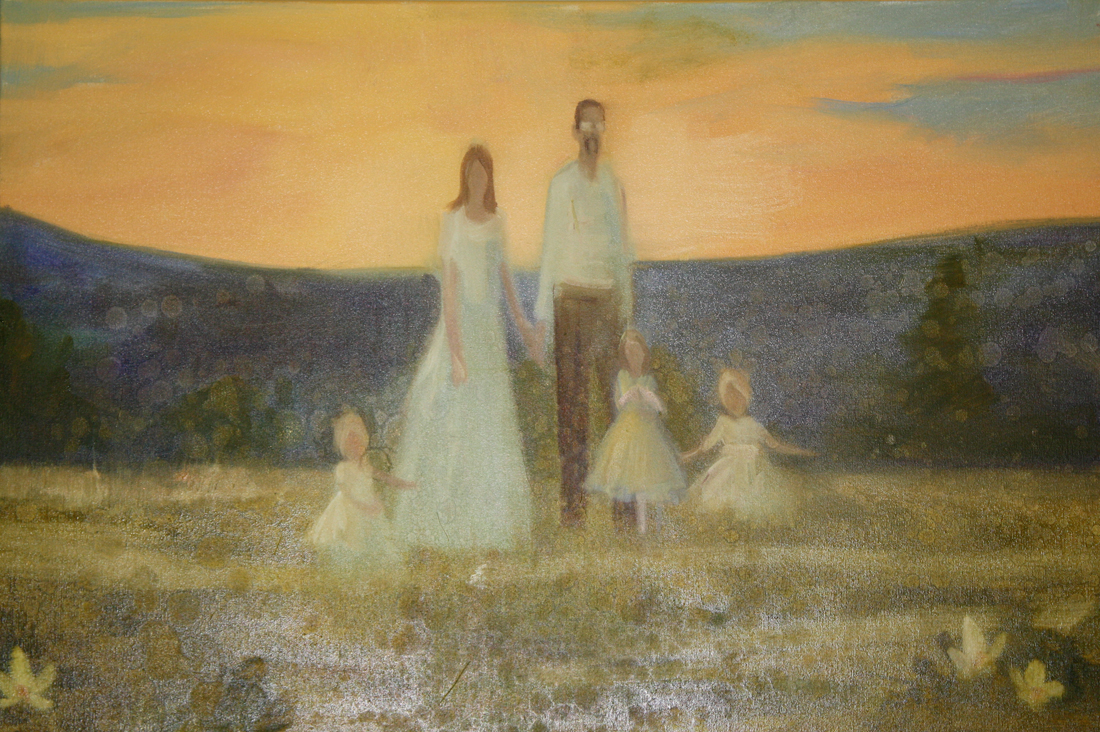 The crocuses in our yard comforted Kristine after our first miscarriage. Like our unborn children, they are precious, beautiful, and alive for only a brief time. When we commissioned Indianapolis artist Kyle Ragsdale to paint our family for our 10th wedding anniversary, Kristine asked him to include a crocus for each unborn child. In many ways, that painting represents our hope for the miscarriages to be part of our lives … not as a dark blot in the center, but nevertheless woven into their creative fabric. Much of that hope is articulated in a letter that I wrote to all my children.
The crocuses in our yard comforted Kristine after our first miscarriage. Like our unborn children, they are precious, beautiful, and alive for only a brief time. When we commissioned Indianapolis artist Kyle Ragsdale to paint our family for our 10th wedding anniversary, Kristine asked him to include a crocus for each unborn child. In many ways, that painting represents our hope for the miscarriages to be part of our lives … not as a dark blot in the center, but nevertheless woven into their creative fabric. Much of that hope is articulated in a letter that I wrote to all my children.
All six of you walked an uncertain road with me as you have borne my burdens through the words of these letters. You will walk that road with me into the future. My unborn children, each of your presence in our lives continues to shape how your mom and I engage our world. You have challenged us to grant you dignity, and encouraged us to not let your deaths be the last word. Elise, Charis, and Clare, you are calling us into the joy of making new life grow. You will learn with us what it means to remember your three siblings, to live with open hands, and to see and speak peace into humanity’s wounds. So we will walk together, until the day when we all meet for the first time.
*****
About the author: Dr. Shawn Collins grew up in Kenya as a missionary kid. This cultural diversity built a foundation that influenced his faith and vocation. His work in the aerospace and energy industries integrates graduate degrees in mechanical engineering and anthropology. He regularly writes and presents on a variety of systems engineering, organizational behavior, and theology topics. Shawn lives in Indianapolis with his wife and three living children.
More information about Shawn’s book Letters to My Unborn Children is available online at www.letterstomyunbornchildren.com. It can purchased there, from Kirkhouse Publishers, or from Amazon. The ebook can be purchased from MemorEmedia.
